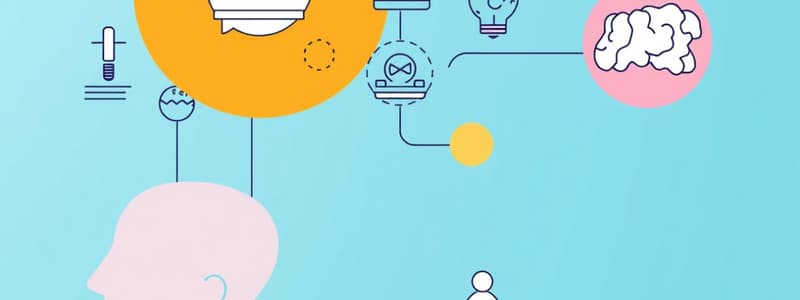Podcast
Questions and Answers
What does the standard error of measurement estimate?
What does the standard error of measurement estimate?
- The reliability of sampling methods
- The difference between observed and true scores (correct)
- The variability of individual test scores
- The extent of variance in a population
Which statistic is used to estimate how significant a difference between two scores is?
Which statistic is used to estimate how significant a difference between two scores is?
- Standard error of the difference (correct)
- Standard error of the score
- Standard error of the mean
- Standard error of measurement
What is meant by internal consistency in assessments?
What is meant by internal consistency in assessments?
- The agreement between test scores across different populations
- The extent to which different tests measure the same construct (correct)
- The reliability of scores obtained from parallel forms of a test
- The stability of test scores over time
What does the reliability coefficient analyze?
What does the reliability coefficient analyze?
Which of the following is NOT a type of standard error mentioned?
Which of the following is NOT a type of standard error mentioned?
What does variability in scores reflect according to the concept of variance?
What does variability in scores reflect according to the concept of variance?
Which statement best describes the standard error of the score?
Which statement best describes the standard error of the score?
How does standard error contribute to understanding sampling error?
How does standard error contribute to understanding sampling error?
What does classical test theory (CTT) imply about an individual's observed score?
What does classical test theory (CTT) imply about an individual's observed score?
Which type of error in measurement can be predicted and accounted for?
Which type of error in measurement can be predicted and accounted for?
What is the primary goal in minimizing error in psychological assessments?
What is the primary goal in minimizing error in psychological assessments?
Which of the following describes random error in the context of psychological testing?
Which of the following describes random error in the context of psychological testing?
In terms of test construction, what does it mean to measure everything you intend to measure?
In terms of test construction, what does it mean to measure everything you intend to measure?
What is a key component of making error as small as possible in a psychological assessment?
What is a key component of making error as small as possible in a psychological assessment?
How does classical test theory view the relationship between true scores and observed scores?
How does classical test theory view the relationship between true scores and observed scores?
What impact does the motivation level of a participant have on psychological test results?
What impact does the motivation level of a participant have on psychological test results?
Flashcards are hidden until you start studying
Study Notes
Introduction to Psych Assessment
- Begins with a foundational understanding of psychological assessments.
- Emphasizes the importance and purpose of psych testing in various contexts.
What Makes a Good Test
- Good tests are reliable, valid, and practical.
- Their ability to measure what they are intended to measure is crucial.
Reliability and Validity
- Error is always present in psychological assessments; minimizing it is key.
- Classical Test Theory (CTT) posits that an individual's observed score consists of their true score plus error.
- True scores are unknown, but the goal is to reduce errors to be close to those true scores.
Types of Error
- Random Error: Unpredictable and can affect scores variably.
- Systematic Error: Predictable and constant; can be accounted for.
Error Variance
- Standard Error of Measurement: Indicates the extent of deviation of an observed score from the true score.
- Standard Error of the Mean: Measures sampling error by comparing samples.
- Standard Error of the Score: Reflects how one person’s scores vary over parallel tests.
- Standard Error of the Difference: Assesses how significant a score difference must be.
Reliability Coefficient
- Evaluates the variance of true scores and error scores.
- Variance indicates how scores differ, often illustrated using standard deviations.
Internal Consistency
- Internal consistency tests measure reliability within assessments.
- Cronbach's Alpha evaluates internal consistency; understanding its limitations is essential.
Test Development
- Focus on developing assessments that accurately capture the entire construct intended for measurement.
- Understanding various methods and approaches for creating reliable and valid tests is critical.
Studying That Suits You
Use AI to generate personalized quizzes and flashcards to suit your learning preferences.




